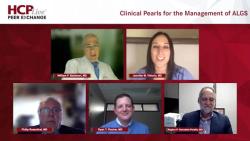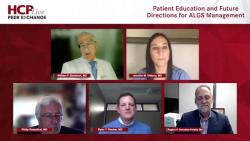Updates in the Management of Alagille Syndrome - Episode 6
Multidisciplinary Management of ALGS
Regino Gonzalez-Peralta, MD, explores the role of a multidisciplinary approach to the diagnosis and management of patients with Alagille syndrome.
William F. Balistreri, MD: Reggie, Jennifer brought up the initial few visits of these patients with Alagille syndrome. She also alluded to the fact that this can be overwhelming. You’re giving them a tremendous amount of information about all the systems that might be involved. In your clinic, who’s involved in the patient journey? When do you call in the rest of the troops? How do you help the family cope with this massive amount of information?
Regino P. Gonzalez-Peralta, MD: That’s a very good point and a somewhat loaded question. I was going to comment as we were talking about the multisystem and involving multiple specialists. I imagine the same would be true with the rest of the panel. For whatever reason, the pediatric hepatologist seems to become the captain of the ship, if you will, for children with Alagille syndrome. Even for those who have primary heart disease or primary neurological disease, it seems as if nothing gets done unless “the liver doctor agrees with it.” That’s important. We become the owners of the care, so I usually get folks involved as they’re needed.
Most patients will have liver disease, which may be why we become the captain. We tend to see most of these patients because liver is a more common manifestation. But if you have heart disease, you need to get your cardiologist involved. If there’s any evidence of potential kidney disease—I’m not saying that you have to have overt [kidney disease]—then get the nephrologist on early enough. It’s the same for neurological disease. With neurological disease, there’s a lot that you tell these parents.
One thing that I focus on in particular in my earlier interactions with these families is highlighting that your child may have a “stroke” from Alagille syndrome, so you need to seek care locally. I often tell these parents, “You’re going to know more about Alagille than whoever you see in the emergency department who’s going to tell you, ‘No, 4-year-olds don’t get strokes,’ or ‘6-year-olds don’t get strokes.’ It’s your job to say, “A 4-year-old can get a stroke because he has Alagille syndrome.” I focus on that because I’ve seen potential disasters where people are blown off because “you can’t have a stroke.” I focus on that a lot.
I also try to focus on what the outcome looks like from a liver standpoint. I offer a little hope that your child may do well, but there’s a chance of liver transplant. Even though there aren’t any excellent biomarkers that you could use to forecast [disease progression], you sometimes have a feel for whether someone might end up going the wrong way. You mention transplant in that context. If you think it’s more likely, then you’ll be more likely to spend more time [on it]. If you think it’s less likely, then [you’ll spend] less time [on it]. If there’s heart disease, you send them to the cardiologist and try to keep a good rapport with all these folks that feed the information to you as the captain.
William F. Balistreri, MD: Well said, Reggie. As Jennifer alluded to, ideally we’d be able to screen for CNS [central nervous system] moyamoya [disease] and therefore predict stroke. Because of all the things that can happen, that can be the most devastating. That has happened in our patient population, both before and after liver transplant.
TRANSCRIPT EDITED FOR CLARITY



